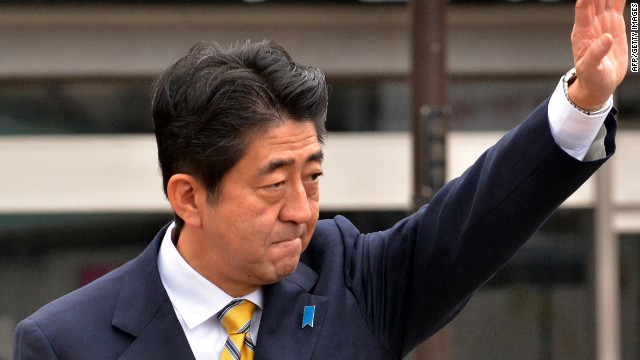
Shinzo Abe is promising a decisive shift in Japan's economic policy.
STORY HIGHLIGHTS
- Former PM Shinzo Abe is campaigning on joint monetary and fiscal stimulus to end persistent deflation
- Abe has threatened legislative action if the Central Bank of Japan doesn't commit to a 2% inflation target
- Given political constraints, Abe is unlikely to secure the working majorities needed to pass such legislation, Scicluna writes
Editor's note: Chris Scicluna is executive director and head of economic research at Daiwa Capital Markets Europe.
London (CNN) -- Hopes that this weekend's Japanese election will
deliver a major policy shift towards delivering higher growth and
inflation have given the country's financial markets a long-overdue shot
in the arm.
Stock markets have rallied, up 10% on the month to their highest levels since April.
The yen, which was
recently within touching distance of its post-war high, causing agony
for Japan's manufacturers, has eased to eight-month lows. And Japan's
long-term interest rates have fallen to their lowest levels since 2003.
Optimism hangs on the electoral rhetoric of LDP leader Shinzo Abe, odds-on to be Japan's next prime minister.
Exasperated by Japan's
two lost decades and persistent deflation, Abe has demanded aggressive
action from Japan's central bank, calling for it to generate 2%
inflation and do whatever necessary -- including buying an "unlimited"
amount of government bonds -- to hit that target.

And harking back to days
gone by, Abe has called for new budgetary stimulus too, including extra
public works spending. But could an Abe-led government really snap Japan
out of its seemingly interminable economic malaise?
Of course, campaigning and governing are two very different things.
And, given the perilous
state of Japan's public finances, the next government will have precious
little room for maneuver to boost public investment.
Dangerous waters: Behind the islands dispute
Indeed, it will have
countless unpalatable budgetary decisions to make, not least making the
social security system affordable given Japan's rapidly aging
population. So, in practice, fiscal policy is unlikely to be able to
provide meaningful stimulus over the term of the next government.
That means that the onus
will be on monetary policy to boost growth and inflation. Following
rebuttals from present Bank of Japan Governor Shirakawa, Abe recently
toned down his attacks on the central bank.
But the LDP manifesto
maintained Abe's commitment to a 2% inflation target, with legislative
action to be considered to force the Bank of Japan's hand if it does not
co-operate.
Of course, whether an
LDP-led government can amend laws related to the central bank, or will
in large part depend on the election outcome.
But even if Abe secures a
comfortable majority in the Lower House, given its lack of control of
the Upper House, it might struggle to secure the working majorities it
will need in the Diet to pass legislation comfortably.
Certainly, a government
reliant on a number of parties to pass legislation may mean that
complicated reforms to shake up the Bank of Japan are likely to remain
more of a threat than a reality.
The opinions expressed in this commentary are solely those of Chris Scicluna
No comments:
Post a Comment